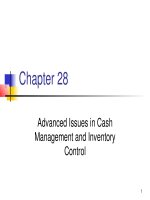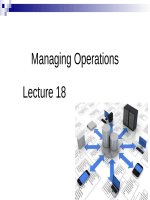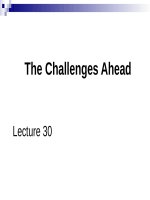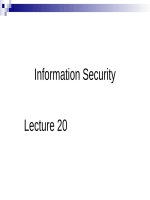Lecture Business management information system - Lecture 28: Management issues in systems development
Bạn đang xem bản rút gọn của tài liệu. Xem và tải ngay bản đầy đủ của tài liệu tại đây (629.17 KB, 49 trang )
Management Issues in
Systems Development
Lecture 28
Today’s Lecture
n
Project Management
¨ What is Project Management
¨ The Job of a Project Manager
¨ Change Management
¨ Risk Management
¨ Tips for Good IT Project Management
Introduction
n
Companies are in three ‘businesses’:
1. Infrastructure Management
2. Customer Relationship
3. Product Innovation
n
Traditionally companies have bundled the three
(businesses)
¨. Leads to compromises because the three
have conflicting agendas
Introduction cont.
n
IS departments can be viewed as being in the same
three businesses:
1. Operations are infrastructure management
2. The help desk is the customer relationship
business
3. System development is product innovation
Introduction cont.
n
Infrastructure management:
¨ Goal = reducing costs
n Providing infrastructure involves high fixed costs
¨ Battle = build scale
¨ Management
focus =
Efficiency
n Standards
¨ As we are seeing with operations and network
management
§
Outsourcing?
n
Introduction cont.
n
Customer relationship:
¨ Goal = provide service
¨ PC support & help desks often outsourced
n Especially in Europe & Asia (multilingual needs)
¨ Outsourcing offshore = increasing dramatically
n
Product innovation:
¨ Goal = speed
n Provides nimbleness
Introduction cont.
¨ Key
to success = talent
n In IT, developers are “king” so they are given the
coolest tools
¨ There
are a number of management issues
surrounding system development:
“Staffing, staffing, staffing”,
n As well as speed & nimbleness
n
Project Management
n
Today, much organizational work is performed via
projects
n
In IS as well as other functions, being able to manage a
project to completion, and deliver the expected outcome
within the allotted time and budget, has become an
increasingly valuable skill
Project Management
What is Project Management?
n
Project Management is simply the management of a
project
¨ May sound simple and self-evident BUT = doesn’t
make it easy!
¨ Many people get confused/concerned because IT
project management contains the dreaded ‘T’ word
– Technology
n In reality IT project management is not that
much different from other forms e.g.
construction
Project Management
What is Project Management? cont.
n
n
A project is a collection of related tasks and activities
undertaken to achieve a specific goal. All Projects (IT
or other) should:
¨ Have a clearly stated goal
¨ Be ‘finite’
n Clear beginning & end
IT Project Management:
¨ 10% technical, 90% common sense
¨ Management styles vary as do backgrounds
¨ Key = keeping in mind, and under control the
numerous interdependencies
¨ GET THE JOB DONE!
Project Management
What is Project Management? cont.
n
Project Management Institute
¨
Project Management encompasses five
processes
1. Initiating
2. Planning
3. Executing
4. Controlling, and
5. Closing
Project Management
What is Project Management? cont.
–
To become a certified PMP = must pass tests
covering nine knowledge areas:
1. Integration
2. Scope
3. Time
4. Cost
5. Quality
6. Human Resources
7. Communication
8. Risk
9. Procurement
Project Management
The Job of a Project Manager
n
Responsible for the following tasks:
1. Setting Up the Project
n
n
Why
¨ A brief background of the project, and
¨ The business objectives to be achieved
What
¨ Key outputs to be produced
¨ Benefits
Project Management
The Job of a Project Manager
n
n
n
When
¨ List of milestones and expected timing
§
High level project plan
Who
¨ Project team
¨ Stakeholders – and their expectations
How
¨ Definition of the work that needs to be
undertaken
¨ Scope
¨ Specific exclusions
Project Management
The Job of a Project Manager cont.
n
Responsible for the following tasks cont.:
2.
Managing the Schedule
n
n
n
n
n
Schedule / project plan = heart of the project and main
communication tool
High level first – then break down as you proceed
Baseline and track
Use automated tools
Recommendations:
Project Management
The Job of a Project Manager cont.
1.
2.
3.
4.
Focus on the date that tasks are/ will be
completed rather than on the % of overall
project completed
Review progress at least monthly, preferably
more often
Focus on tasks to be completed Vs. those
finished
Reforecast when new evidence comes to light
Project Management
The Job of a Project Manager cont.
n
Responsible for the following tasks cont.:
3.
Managing the Finances
n
n
Financial plan, who is accountable, benefits etc.
Baseline costs and track
¨
n
They will change!
Need to know how much has been spent and how
much money is left
Project Management
The Job of a Project Manager cont.
4.
Managing the Benefits
n
n
n
n
n
Difficult to estimate but must try
Base on same assumptions as costs
Look at timings
Track
Why are we doing this????
¨
Should we still be doing it?
Project Management
The Job of a Project Manager cont.
n
Responsible for the following tasks cont.:
5. Managing Risks, Opportunities and Threats
n
Risk mitigation and risk management
n
Usually poorly done
n
Risk logs
n
Issue management
7. Soliciting Independent Reviews
n
Health checks (of the project)
¨ By someone independent (could be
external)
Project Management
Change Management
n
IS often assume a technically elegant system is a
successful system. (IT’S NOT!!!)
n
Many technically sound systems have turned into
implementation failures because the people side of the
system was not handled correctly
n
System is only a success if it meets the users’
requirements and they are happy with it and with using
it
Project Management
Change Management
n
Information technology is all about managing change
n
New systems require changing how work is done
n
Focusing only on the technical aspects is only half the
job – the other job is change management
Project Management
Change Management cont.
n
Changing management = process assisting people to
make change in their working environment
¨ Change – caused by the introduction of a new
computer system
n
People resist change, especially technological
change, when they view it as a crisis. ‘Resistance’
includes:
¨ Deny the change
¨ Distort information they hear about the change
¨ Convince themselves and others the new system
will not change status quo
Project Management
Change Management cont.
n
n
ODR (among others) offers a methodology to help
companies manage technological change
Type of people involved in a change project
¨
Sponsor: the person or group that legitimizes the
change
¨
Change agent: the person or group who causes
the change to happen
¨
Target: the person or group who is being expected
to change and at whom the change is aimed
Project Management
Change Management cont.
Methodology to manage technological change
n Conduct surveys with all three groups to determine:
¨
Whether the scope of the project is do-able, or
whether the organization is trying to change too
much at one time
¨
Whether the sponsors are committed enough to
push the change through, or whether they are
sitting back expecting the organization to change
on its own
¨
Whether the change agents have the skills to
implement the change, or whether e.g. they are
not adept at rallying support
¨
Which groups are receptive to the change and
which are resistant
THE BOC GROUP
Case Example – Change Management
n
n
n
n
Industrial gas manufacturer – operates in 60 countries
Industry= mature & highly competitive
Competition = price & service
$35million to improve position – reengineering BOC’s core
processes:
¨ 9 reengineering projects over 2 ½ years
¨ All team members guaranteed a job after project in
same or equivalent work
¨ Teams co-led by Business and Information
Management (IM) process leader, as IT major
component of project









